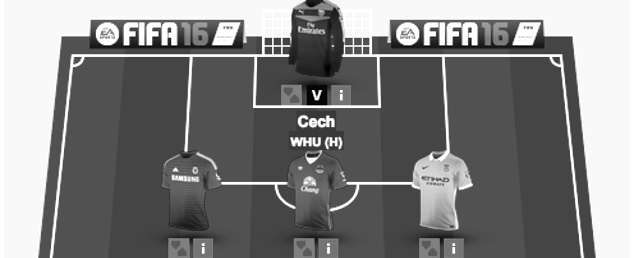Today’s launch of the Fantasy Premier League (FPL) game sprung a few surprises, with the addition of some intriguing new rules that will bring an extra tactical element to our approaches in the season ahead.
In the first of our articles focusing on these new mechanics, we turn our attentions to the three chips, which, as explained by the official website:
Chips can be used to potentially enhance your team’s performance during the season.
Only one chip can be played in a single Gameweek. The chips available are as follows:All Out Attack – Allows you to play a 2-5-3 formation in the next Gameweek.
Bench Boost – The points scored by your bench players in the next Gameweek are included in your total.
Triple Captain – Your captain points are tripled instead of doubled in the next Gameweek.
Immediately, it stands to reason that the best time to exploit these chips would be during a double Gameweek in order to maximize our points potential, though as Jonty’s Hot Topic discussed this morning, there are still a number of Gameweeks worth keeping an eye on, should they fail to harvest a pair of fixtures.
Bench Boost
Wielding this chip means that Fantasy managers will gain all points accrued from their 15-man squad in that particular Gameweek. In all likelihood, this has the greatest potential of any of the three chips and assessing when to play it will be crucial.
In order to get the full benefit from the “Bench Boost” chip, the ideal time would be a double Gameweek where a number of clubs are handed a pair of fixtures apiece.
Last season’s double Gameweek 34 saw four clubs – Chelsea, Hull, Leicester and Liverpool – feature twice, for example. Although Captain Poll favourite Eden Hazard blanked on both occasions, as many as 17 players produced a minimum of ten points, which highlights the potential of the “Bench Boost” chip.
By comparison, double Gameweeks 28, 31 and 37 – containing two teams apiece – produced ten points or more on four, four and eight occasions respectively.
Certainly, this chip will encourage Fantasy managers to roll out numerous alterations to their starting line-ups – not only does each double player feature twice, the single Gameweek assets also contribute points, thus helping to offset any possible points hits.
Furthermore, when factoring in the new Wildcard changes, it would perhaps seem that the second Wildcard would be best kept to take advantage of this particular chip. By playing a Wildcard the week before a bumper double Gameweek, canny Fantasy managers could load up on double options – therefore avoiding the need for points hits – and structure their squad in line with the impending double Gameweek.
Another factor of the “Bench Boost” chip is that it allows us to play two keepers in the Gameweek. Intriguingly, a pair of keepers earned at least ten points apiece in two of last term’s four doubles. Partnering Steve Harper with either Simon Mignolet or Kasper Schmeichel in the aforementioned Gameweek 34 would have earned you 30 points, whilst a Costel Pantilimon-David Ospina double-up would have produced 24 points in the penultimate round of fixtures. A nice tactical twist that certainly changes how we’ve previously approached double Gameweeks.
Monitoring the fixtures and assessing when the doubles are likely to fall in place will be key, then.
The Capital One Cup Final, for example, will take place on Gameweek 27 and will force a fixture reschedule for the two teams that make the Wembley showpiece. We also know that the Gameweek 30 schedule will be subject to change as it falls on the same weekend as the FA Cup Sixth Round – keeping a Wildcard up your sleeve could prove a devastating tactic in many mini-leagues, particularly if this involves more than a couple of teams.
Whilst the domestic cups tend to prove the catalyst for most rearranged fixtures, there’s also the weather to consider, too. As we’ve seen in the past, the unpredictable festive elements could prompt postponements and may even tempt some Fantasy managers to wield one of their three chips, particularly if the squads of mini-league rivals are hit hard by the weather. Nonetheless, the allure of a double Gameweek is likely to ensure we remain patient with our plans in order to reap the full benefit.
Triple Captain
Again, it seems logical that this chip should be played in a double Gameweek in order to boost your chances of earning more points.
It’s no coincidence that all but one of the four doubles last season supplied us with the highest scoring player in the Gameweek. The one exception being Gameweek 37, where Southampton’s Sadio Mane chalked up 23 points after producing three goals, an assist and maximum bonus in the 6-1 home win over Villa.
Bearing in mind we cannot use more than one chip at a time, the “Triple Captain” is perhaps best utilised in a two-team double Gameweek, in order to ensure we keep our “Bench Boost” chip for a bumper double.
Looking back to last term, for example, Harry Kane earned 15 points in Tottenham’s double Gameweek 28, whilst Christian Benteke and Charlie Austin amassed 23 and 21 points respectively when Villa and QPR were handed a pair of fixtures apiece in Gameweek 31. Wielding the “Triple Captain” in the latter Gameweek would have racked up 60+ points if you’d handed Benteke or Austin the armband and also allowed you to keep the “Bench Boost” chip for Gameweek 34.
Furthermore, the “Triple Captain” also helps to lessen the blow of a faltering armband pick. Eden Hazard and Alexis Sanchez were the runaway leaders of our Captain Poll for double Gameweeks 34 and 37 respectively but limped home with just five points apiece. The “Triple Captain” option would at least have handed us 15 points from both players, despite their failure to produce any returns over their pair of matches.
All Out Attack
This chip allows you to opt for a 2-5-3 formation in any given Gameweek. Bearing in mind that the majority of Fantasy managers operate with a 3-4-3 set-up, this essentially will afford us the opportunity to replace a defender with a midfielder for the selected Gameweek.
The main knock-on effect of the “All Out Attack” chip is that it forces us to reconsider our cheap fifth midfielders. Many started with the likes of Dean Marney or Marc Albrighton last season and were content to keep them on their benches, despite a lack of returns and minutes respectively. Freshening up that position will be key to take advantage of this chip, then. Similarly, those operating with a 3-5-2 formation will need to address their third forward slot in order to make the most out of the “All Out Attack” chip.
Again, it would seem most beneficial to use this chip during a double Gameweek, thus ensuring that our extra attacker has a pair of fixtures to profit from.
As we saw during last season’s doubles, the likes of Andros Townsend (15 points), Ryan Mason (13 points), Matty Phillips (20 points), Marc Albrighton (13 points) and Ahmed Elmohamady (ten points) all proved canny cut-price options in the centre of the park.
Arguably, though, this chip has the potential to frustrate Fantasy managers. Only seven midfielders and six forwards managed double-figure hauls during last season’s doubles, compared to five keepers and 15 defenders.
Clearly, then, taking out a defensive option to bring in an attacker will still carry a degree of risk, though there’s no doubt that the potentially explosive points hauls on offer from a midfielder or forward have a greater upside, given that a goal would essentially cancel out the opposition’s defensive points.



9 years, 4 months agoDepay is fantasy gold